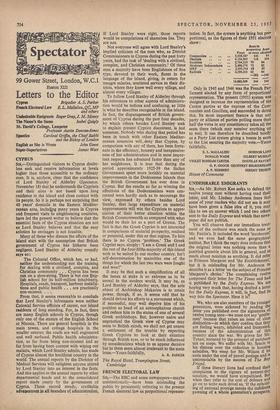Letters to the Editor
Cyprus Brigadier A. S. Parker French Electoral Law E. L. Mallalieu, QC, MP and others Undesirable Emigrants Roger Gray, J. M. Money The Name's the Same Isabel Quigly St. David's College, Lampeter Professor Austin Duncan-Jones Spastics Cardinal Griffin, the Chief Rabbi and the Bishop of London English as She is Wrote John Guest Super-Superlatives James Watt CYPRUS
SIR,—Distinguished visitors to Cyprus doubt- less seek and receive information at levels higher than those accessible to the ordinary man. It is, anyhow, clear that the confidence of Lord Stanley of Alderley (Spectator, November 18) that he understands the Cypriots and their aims is not based upon long residence in the island and close contact with its people. So it is perhaps not surprising that 41) years' domicile in the Eastern Mediter- ranean area, including many years in Cyprus and frequent visits to neighbouring countries, have led the present writer to believe that the essential facts of the Cyprus situation arc not as Lord Stanley believes and that the easy solution he envisages is not feasible.
Many of those who discuss the affairs of the island start with the assumption that British government of Cyprus has hitherto been negligent Lord Stanley of Alderley roundly
says so:
The Colonial Office, which has, or had, neither the understanding nor the training for dealing with a civilised, complex, and Christian community . . . Cyprus has been run on a shoe-string. There is but one Eng- lish school for its half-million inhabitants. Hospitals, roads, transport, harbour install- dons and public health . . are practically non-existent. . . .
From that, it seems reasonable to conclude that Lord Stanley's informants were neither Colonial Service officials of career, nor island residents of long standing. For, in fact, there are many English schools in Cyprus, though only one of the stature of the English School at Nicosia. There are general hospitals in the main towns, and cottage hospitals in the smaller centres; the roads are well engineered and well surfaced. Public health administra- tion, so far from being non-existent and so far from having been content with wiping out malaria, which Lord Stanley admits, has made of Cyprus almost the healthiest country in the world. The annual reports by the Director of Medical Services will enlighten anyone stirred by Lord Stanley into an interest in the facts. And this applies to the annual reports by other departmental heads and to the consolidated report made yearly by the government of Cyprus. These record steady, creditable advancement in all branches of administration. If Lord Stanley were right, those reports would be compilations of shameless lies. They are not.
Not everyone will agree with Lord Stanley's implied criticism of the men who, as District Commissioners in Cyprus during the past forty years, had the task of 'dealing with a civilised, complex, and Christian community.' Of these men a majority have been Englishmen of fine type, devoted to their work, fluent in the language of the island, giving, in return for meagre salaries, unstinted service to their dis- tricts, where they knew well every village, and almost every villager.
To follow Lord Stanley of Alderley through his references to other aspects of administra- tion would be tedious and confusing, so little is what he describes recognisable in the island. In fact, the disparagement of British govern- ment of Cyprus during the past four decades, by which others besides Lord Stanley seek to explain present Cypriot discontent, is just nonsense. Nobody who during that period has been in touch with other Eastern Mediter- ranean countries will. deny that Cyprus, by comparison with any of them, has been fortu- nate in the efficiency, honesty and inexpensive- ness of her administration and in most impor- tant respects has advanced faster than any of her neighbours. It is true that during the period approximately 1925-39 the Italian Government spent more lavishly on material improvements in the Dodecanese Islands than the British Government has ever done in Cyprus. But the results so far as winning the affections of the Dodecanesians were con- cerned were hardly such as to encourage the view, expressed by others besides Lord Stanley, that large expenditure on material improvements will win the Cypriots to appre- ciation of their better situation within the British Commonwealth as compared with what would be their lot as a part of Greece. The fact is that the Greek Cypriot is not interested in comparisons of material prosperity, realised or potential, under this or that regime. To him there is no Cyprus 'problem.' The Greek Cypriot says, simply : 'I am a Greek and I and the rest of the four-fifths majority of this island wish to be united fo our mother country. Isn't self-determination by majorities one of the things for which the last two wars were fought and won?'
It may be that such a simplification of all the issues at stake is so extreme as to be unreal in the modern world. It may be, as Lord Stanley of Alderley says, that the sole object of Archbishop Makarios is to retain power, though, if so, it seems odd that he should des%ote his efforts to a movement which, if successful, may well deprive him of his position as head of an autocephalous church and reduce him to the status of one of several Greek archbishops. But, however naive and unpractical the Greek view of Cyprus may seem to British minds, we shall not get nearer a settlement of the trouble by expecting Greek Cypriots to look at their situation through British eyes, or to be much influenced by considerations which to us appear decisive but to them seem almost irrelevant to the main issue.—Yours faithfully,
A. S. PARKER
The Royal Hotel, Trumpington Street, Cambridge


























































 Previous page
Previous page